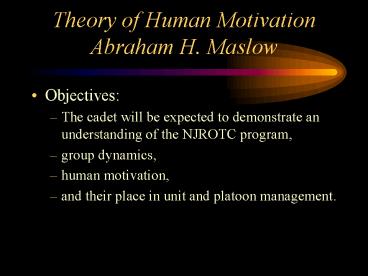Theory of Human Motivation Abraham H' Maslow - PowerPoint PPT Presentation
1 / 24
Title:
Theory of Human Motivation Abraham H' Maslow
Description:
One becomes more wise and automatically knows what to do in a wide variety of situations. ... Fear of not being able to complete homework, schoolwork, project. ... – PowerPoint PPT presentation
Number of Views:4848
Avg rating:3.0/5.0
Title: Theory of Human Motivation Abraham H' Maslow
1
Theory of Human MotivationAbraham H. Maslow
- Objectives
- The cadet will be expected to demonstrate an
understanding of the NJROTC program, - group dynamics,
- human motivation,
- and their place in unit and platoon management.
2
Maslows Hierarchy of Needs
- Theory of Human Motivation
- An understanding of basic human motivational
theory is vital to effective leadership. - According to Maslow, human motivation is based on
a hierarchical system of needs. In ascending
order, there are physiological needs, safety
needs, love and belonging needs, status and
esteem needs, and the need for self-actualization
and self-fulfillment.
3
(No Transcript)
4
The Physiological Needs
- Basic needs such as hunger, thirst, warmth, air,
and so on. - They may include various sensory pleasures as
touch, hearing, tasting, smelling, under certain
circumstances. - If these needs are unsatisfied, all other needs
may become nonexistent or be pushed into the
background.
5
The Safety Needs
- These include such things as shelter from the
elements, feeling secure from attack, freedom
from disorder, fear and anxiety. - Individuals being motivated at this level often
seek out a protector, or stronger people on whom
they depend.
6
The Love Needs
- These needs concern the desire to affiliate with
others, be accepted, and to belong. - The lack of fulfillment of these needs is the
most core cause of cases of maladjustment and
many other psychological problems. - Love needs involve both giving and receiving.
Feeling accepted and wanted.
7
The Esteem Respect Needs
- These include such things as the need to achieve,
feel competent, and gain approval and
recognition. Recognition by others of competence
and accomplishments. - Satisfaction of these needs leads to feelings of
self-confidence, worth, strength, and capability.
8
Esteem Respect Needs cont..
- Thwarting these needs produces feelings of
inferiority, weakness, and helplessness.
9
Self-actualization Cognitive Understanding
- These refer to the need to find self-fulfillment
and realize ones unique potential. - This stage usually not accomplished during
adolescence.
10
Self-actualization Cognitive Understanding
- One becomes more wise and automatically knows
what to do in a wide variety of situations. - We test ourselves for its own sake, to prove our
worth to ourselves and to show we can still do
it. Taking risks is another phrase for that.
11
Self-actualization
- The only reason that people would not move
through the needs to self-actualization is
because of the hindrances placed in their way by
society. Example - Education is often a hindrance with imposed ideas
of the culture. - On the other hand respectful teaching promotes
personal growth.
12
Transcendence
- To help others find self-fulfillment and realize
their potential. - Maslows basic position is that as one becomes
more self-actualized and transcendent, one
becomes more wise (develops wisdom) and
automatically knows what to do in a wide variety
of situations.
13
Personal Growth
- Teach to be authentic to be aware of their inner
selves and to hear inner feeling voices - Teach to transcend their own cultural
conditioning, and become world citizens - Help discover their vocation in life, their
calling, fate or destiny. - This is especially focused on finding the right
career and the right mate.
14
Personal Growth cont..
- Life is precious, that there is joy to be
experienced in life - if you are open to seeing the good in all
situations, it makes life worth living. - Accept the person and help them learn their inner
nature - from real knowledge of aptitudes and limitations
we can know what to build upon.
15
Personal Growth cont..
- Satisfy basic needs this includes safety,
belongingness and esteem needs. - We should refresh consciousness, teaching to
appreciate beauty and the other good things in
nature and in living. - We should teach people that controls are good,
and complete abandon is bad - It takes control to improve the quality of life
in all areas
16
Personal Growth cont..
- We should teach to transcend the trifling
problems and grapple with the serious problems in
life. - These include the problems of injustice, of pain,
suffering and death. - We must teach to be good choosers.
- Give practice in making choices
17
Typical Issues
- 11-14 year olds
- Fear of unknown concerning sexuality.
- Fear of being unpopular.
- Fear of being selected first (having to lead a
team or group).
18
Typical Issues 11-14 yr. olds
- Fear of being selected last (implying being
disliked or unpopular). - Fear of not being able to complete homework,
schoolwork, project. - Extreme concern over emotional happiness/unhappine
ss.
19
Typical Issues
- 15-18 year olds
- Fear of sexuality (based on lack of information
concerning sex). - Fear that another peer will vie for the person
they are dating. - Fear of being ridiculed in class when asked to
speak or demonstrate.
20
Typical Issues 15-18 yr. old
- Fear that adults will interpret roles for them
(they seek to define themselves in relation to
peers and their own values and goals). - Fear of inadequate vocational or academic
training.
21
Manifestation of typical concerns
- Alcoholism Drug abuse
- Depression, anxiety, anorexia, suicide
- Lack of self control, irresponsibility,
absenteeism, violence
22
Developmental Goals
- Gaining self awareness
- Developing positive attitudes
- Making healthy choices and effective decisions.
- Respect others
23
Developmental Goals cont..
- Gaining responsibility
- Developing relationship skills
- Resolving conflicts
24
Created by
- LCDR Cook, NSI
- Curtis Senior High School
- University Place, WA































